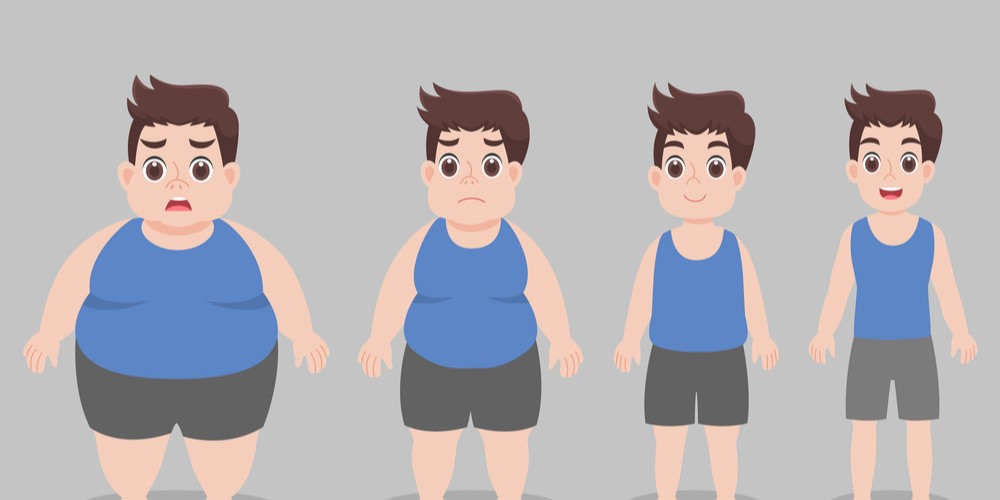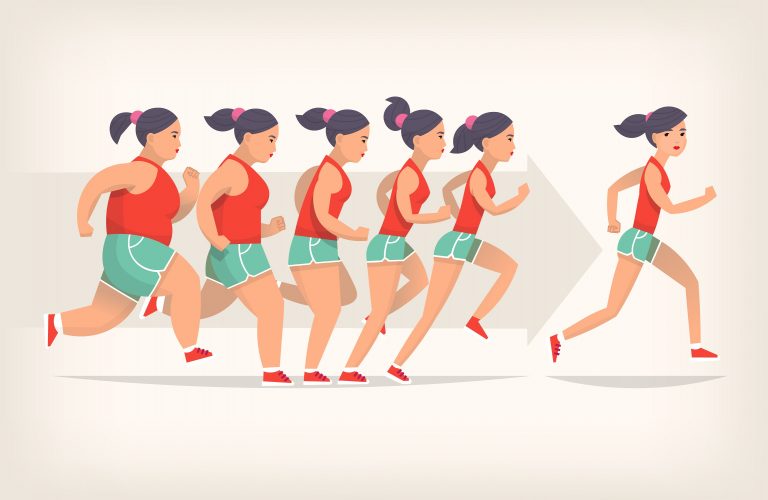
If you want a flexible, balanced, toned, and strong body that is in perfect shape, there is no doubt you need to start with losing weight if you are under the category of overweight people. But don’t forget that losing weight is not easy if you don’t understand the science of doing it, and if you know how to lose weight easily, you will do it like playing a game, which will give you better results in a short time. In this article, we have brought you the main stages of losing weight that you can consider and practice to tone your body.
Table of Contents
Overview of stages of losing weight:
Do you believe that every morning, when you wake up, your body has an extra weight up, and the scale of your measuring device always goes right? But that’s not the actual weight you have got. Understand the difference. For example, if you see that your weight is 4 pounds more than yesterday, it’s not the body mass that has increased. It is a waste in your body that is stored as stool because we eat food, drink water, and until it’s not cleared, it feels like you gained extra pounds.

How Does One Lose Body Mass?
Remember that losing weight means decreasing body mass. It is also known as fat loss or body mass loss. That will help to see if the weighing device shows the left side. But you need to consider the four stages of losing weight, strictly follow them, and keep consistent with losing weight. Let’s discuss them in detail.
1st Stage Of Losing Weight:
It is known as glycogen depletion. Do you know what it is? Each body stores sugar in the form of stored sugar or glycogen. This stored sugar helps you do whatever you want to work with your body. For example, it helps you stay warm, keep moving, and exercise. An average human being stores 300-400 calories of glycogen in his liver, but the actual fat-gaining thing is storing 2000-10,000 calories in muscles. Muscles are like balloons, which quickly shrink and grow. That’s why you can see muscle growth when you perform the exercise. The following points are a must to keep in mind for the first stage of losing weight.
- Take a calorie deficit diet, and your body begins to burn fat stored in the liver, and minor burning occurs from muscles. It is like your savings account. The more you take on a calorie deficit diet, it will burn more fat.
- Then, the body burns more fat to give energy to your body, but this weight loss is different from weight loss due to dehydration.
- When you decrease the water intake, the body decreases the water storage, which may cause dehydration. Do you know that bloating is a storing of extra water? It is not comfortable for anyone and can be dangerous too!
- Your body dehydrates at night, and you need to replace the fluids in the morning.
- Water is essential for burning stored body fat, so it’s not good to cut water intake while losing weight.
2nd Stage Of Losing Weight:
The next of four stages of losing weight is losing fat. If you lose fat, it’s a sign that you have undergone a healthy weight loss. It would be best if you sustained this stage, keep going and keep consistent until you get the desired weight. Of course, when you practice fat loss, you will experience hunger before meals, but it’s not starving. Your body has enough energy, and you can sleep well and experience a healthy rate of weight loss.
3rd Stage Of Losing Weight:
Once you are ok with a calorie deficit diet and have spent enough time on a calorie deficit diet, you will enter into the third of four stages of losing weight, known as a plateau. In this stage, your body will decrease the rate of metabolism that it does for preserving energy. It helps you to see desired results of fat loss. You can continue taking your diet in the fat loss phase, but the body starts saying it’s enough. That’s why the metabolic rate will reduce to store no fats and energy. Consider the following points.
- When you want to go shopping, you spend much on unnecessary things, but a time comes when you think shopping is not good for your pocket. That’s similar to your body because it helps you retain the energy in the plateau stage. So you don’t run out of energy.
- Also, a calorie deficit diet is more effective when practiced with intense workouts, and you will lose more fat and weight.
- When you feel your body doesn’t lose fats anymore, you must understand it’s not the right way to lose weight with your workout. In this stage, you may see your body losing its tone, which is the sign you need to enter in the fourth stage.
4th Stage Of Losing Weight:
In this stage, you will work on the recovery of metabolic rate. Help your body to recover from its low metabolic rate, and you need to get to the routine lifestyle you had before your weight loss journey. Hence, you will start eating a healthier diet as you did before the weight loss diet, experience the energy more and more, your body will start giving its best to you, and you can perform well. Things to consider in the fourth stage of losing weight.
Once you recover from your low metabolism, the body starts getting hydrated, storing glycogen, and will keep going. But that’s not the sign of gaining weight. But there is a possibility that you may experience weight gain in a few months. So, measure your weight and keep going.
You can search on the internet on how to heal low metabolism successfully. You will notice some trustworthy and legit articles with detailed guides on healing low metabolism without gaining much weight.
Workout Ideas For Male & Female:
- We discussed that an intense workout with a calorie deficit diet would give better and quicker results. That’s why we have shared a scientific way to work out ideally and lose weight effectively for men and women.
- Average women of five feet height should take 1180 calories a day with a workout that would completely stop them from gaining weight. It is the best way to recover from a low metabolism.
- Average men of six feet tall need to take at least 2400 calories to help recover from a low metabolism.
- However, these situations are ideal and may not be suitable for all. So, it’s always best to consult a doctor, dietician, or nutritionist. And talk about your overall health so they can suggest the appropriate and individually planned diet.
Bulletins On Four Stages Of Losing Weight To Manage Your Weight:
- First, your body gains weight that is unbearable for you.
- It will begin storing glycogen as much as possible, which causes fat storage.
- You are not managing your weight. That’s why you’re overweight.
- You became serious and conscious about your health and fitness due to some health issues.
- Start glycogen depletion.
- Practice a fat loss diet and exercise.
- Experience plateau and keep going for more results.
- Your metabolism has been too low, and you will recover to get healthier.
Points To Remember About Stages Of Losing Weight:
Everyone heals differently and gets different results.
Some people may also experience the adverse effects of weight loss in the initial stages if not performed correctly. That’s why anything you do with your body, do it only after consulting a medical expert.
Once you achieve your desired results, it’s not guaranteed that your body will be in perfect shape for a long if you stop practicing. Body changes every day. You may experience further weight loss or weight gain within a few weeks or months.

It is not practically possible to measure each calorie you take, but measured meals will keep you in tone for a long. Individuals get different results because all people have different body shapes, natures, eating habits, workout habits, and metabolism. Also, diseases play a big role.
Wrapping Up:
Did you understand how these four stages of losing weight can help you tone, reshape, and healthify your body? We have discussed four stages of weight loss that you can practice and get better results. Still, we advise you to consult a physician, dietician, or nutritionist and discuss your overall health, health goals, and how your body responds to changes made, but please don’t change your eating habits, way of living, and lifestyle before talking to doctors. The human body responds immediately to changes, which may be dangerous sometimes for many reasons.
I m a passionate blogger. I have completed my MBA in IT and marketing also worked as an SEO Executive for 3 years. Now I v around 2 years of experience in writing content with multi-directional topics. I used to spend a lot of time surfing to getting exposed to the multi-topics & day to day arena of knowledge. My words have touched millions of people. Basically, I put love into words and help you connect to matters thoroughly and simply.







